Birman cats are favored by many due to their loving and affectionate personalities. They also make perfect family animals and love to be social. If you’re interested in one of these cute creatures, you may want to be updated on the latest Birman cat prices.
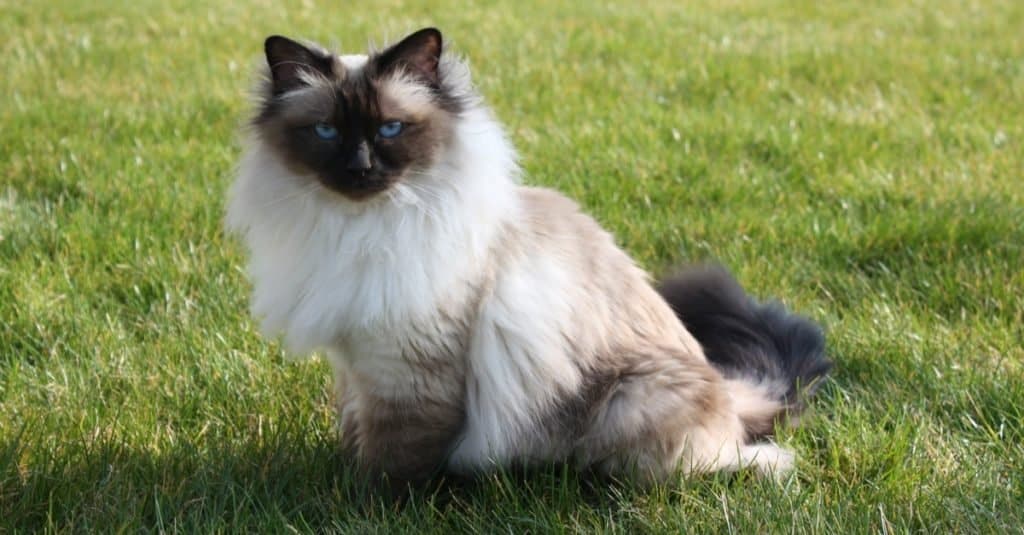
Birman cats
are favored by many due to their loving and affectionate personalities.
©Tine Robbe/Shutterstock.com
Becoming a cat owner requires more than just the purchase cost. You’ll need to factor in medical expenses, vaccinations, bowls, cages, and more. These items can quickly add up if you don’t set a budget beforehand.
As a potential Birmna cat owner, you will need to be aware of the cost of raising one. Don’t worry if you don’t know where to start. Below, we’ve crafted a Birman cat prices guide that lists purchase costs, medical expenses, and any items needed to raise the breed.
How Much Does a Birman Kitten Cost?
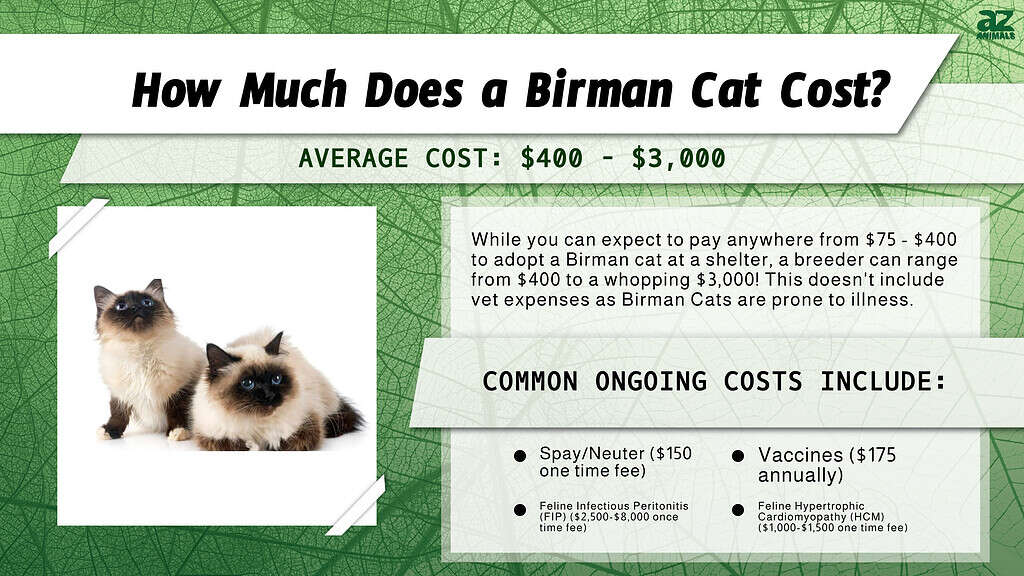
Before adding a new Birman kitten to your home, you must ensure you set aside the correct amount for purchasing them. There are a few options for obtaining a Birman kitten, some of which are less costly. Here is a breakdown of your different options.
Pet Adoption
The most inexpensive method is to find a shelter or rescue. Generally, adoptions cost anywhere from $75 to $400. While this is the most affordable method, Birman kittens are rarely seen inside shelters. This is because a purebred Birman is rare in the United States.
Buying From a Breeder

Birman kittens are
rarelyseen inside shelters.
©Liudmila Chernetska/Shutterstock.com
Breeders are your next best bet for getting a purebred Birman kitten. A young kitten can range from $400 to $3,000. Breeders can be found via The International Cat Association (TICA) or the Fanciers’ Association (CFA).
Buying from a breeder that is under one of the two organizations ensures that they have ethical breeding practices. Not only that, but it ensures that the breeder has purebred kittens and that they follow strict breeding practices. This includes taking the cats and kittens to the vet, tracking genetic lines, and ensuring no illnesses or diseases are passed down.
Other Factors That Influence the Purchase Price of a Birman Cat
Pricing changes depending on a few factors for the Birman breed. While breeders generally charge an average of $1,500, a few factors influence the overall price. Below, we’ll cover the main three.

Rare genetics that produce specific coat and pattern types can increase the overall price of a Birman kitten.
©Kristin Kokkersvold, Copyrighted free use, via Wikimedia Commons – License
Coat Color & Pattern Type (Silver Birman Tabbies)
Every cat breed has unique genetics that impacts a cat’s appearance. Rare genetics that produce specific coat and pattern types can increase the overall price of a Birman kitten. The rarest color and coat for the Birman breed is a Silver Birman Tabby which costs $3,000.
Bloodline
The Birman breed originated in Myanmar and France, so a purebred Birman with traceable linage costs more. Imported Birman cats tend to have a specific type of look with long hair, a silky coat, blue eyes, and white gloves on each paw. Kittens with traceable paperwork and pedigree will end up costing more.
Genetics
Unfortunately, the Birman is known for having a handful of genetic health issues that can be passed down to offspring. Breeders who avoid these issues will ask for a higher payment. This is because they spend extra time medically monitoring their cats and kittens to ensure there are no health issues they are unaware of.
Cost of Vaccination and Other Medical Expenses for a Birman Cat
Medical Treatment | Cost |
|---|---|
| Spay/Neuter | $150 |
| Vaccines | $175 |
| Microchipping | $20 |
| Wellness Check | $55 |
| Feline Hypertrophic Cardiomyopathy (HCM) | $1,000-$1,500 |
| Feline Infectious Peritonitis (FIP) | $2,500-$8,000 |
| Cataracts | $2,800-$3,000 |
Vaccinations and other medical treatments should be budgeted before getting a cat. While most kittens tend to be healthy, the Birman has some health issues that might appear later in life. Knowing about these conditions can help with early treatment and inform you of the costs.
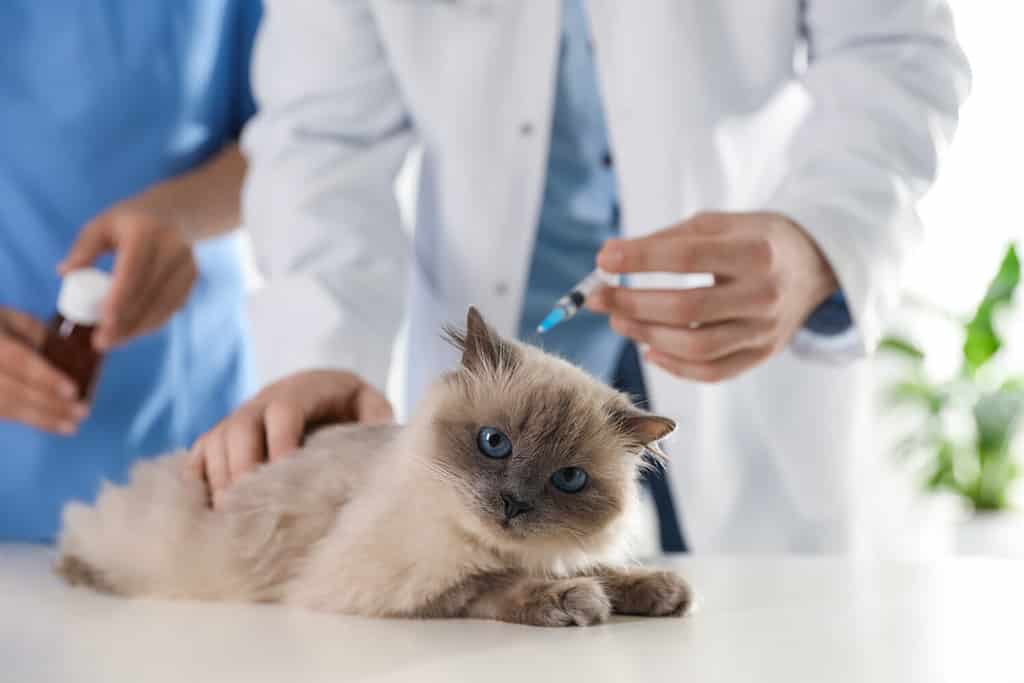
While most kittens tend to be healthy, the Birman has some health issues that might appear later in life.
©New Africa/Shutterstock.com
Mandatory Vaccinations
Kittens are required to get vaccinations at around six weeks and continue them until they are sixteen weeks of age. Vaccinations help prevent your kitten from getting a deadly virus or disease. Generally, breeders will begin giving kittens vaccinations and require the buyer to take the cat to the vet until completion.
Vaccinations that a kitten must have are:
- Feline panleukopenia virus (FVR/FHV-1)
- Feline herpesvirus-1 (FCV)
- Feline calicivirus vaccines (FPV)
These vaccines generally cost anywhere from $25 to $50 each, which will run a total of between $115 to $210. However, you need to calculate the costs of going to the vet, which will also be another $50 to $100.
Feline Hypertrophic Cardiomyopathy (HCM)
Feline Hypertrophic Cardiomyopathy is a condition in cats that affects their heart’s walls. The walls thicken and will overall decrease the heart’s effectiveness. Symptoms include blood clots, which can easily take a cat’s life.
Once a cat is diagnosed, it may only have up to two years to live. The treatment for this condition ranges from $1,000 to $1,500. You must also plan for extra expenses such as office visits, medicine, etc.
Feline Infectious Peritonitis (FIP)
Feline infectious peritonitis is a viral disease called the feline coronavirus. It’s a rare disease that Birman cats are susceptible to. In most cases, cats who catch the virus will only last for a few months or, in rare cases, a year.
Treatment for FIP is expensive and can run anywhere from $2,500 to $8,000. This amount will cover everything for the duration of treatment. However, costs for testing and diagnosis can also add another $150 to $500.
Cataracts
Cataracts are a type of illness that makes the eyes cloudy. The cloudiness ends up causing blindness as it spreads. Generally, owners do not pay for treatment, as cats with partial cataracts can still navigate. However, if you plan to help cure cataracts, it can cost anywhere from $2,800 to $3,000.
Cost of Food and Supplies for Birman Cat
| Cat Supplies | Average Cost |
|---|---|
| Food | $10-$50 |
| Food & Water Bowl | $10-$30 |
| Bed | $30 |
| Nail Clippers | $10-$30 |
| Litter Box | $10-$200 |
| Litter | $5-$60 |
| Brush | $5-$10 |
| Toys | $5-$100 |
| Carrier | $50-$100 |
Cat supplies can range from food to a carrying case. As a Birman cat owner, you will need to invest in a handful of supplies for your new furry friend. Below, we’ve highlighted supplies you may need to raise a Birman.
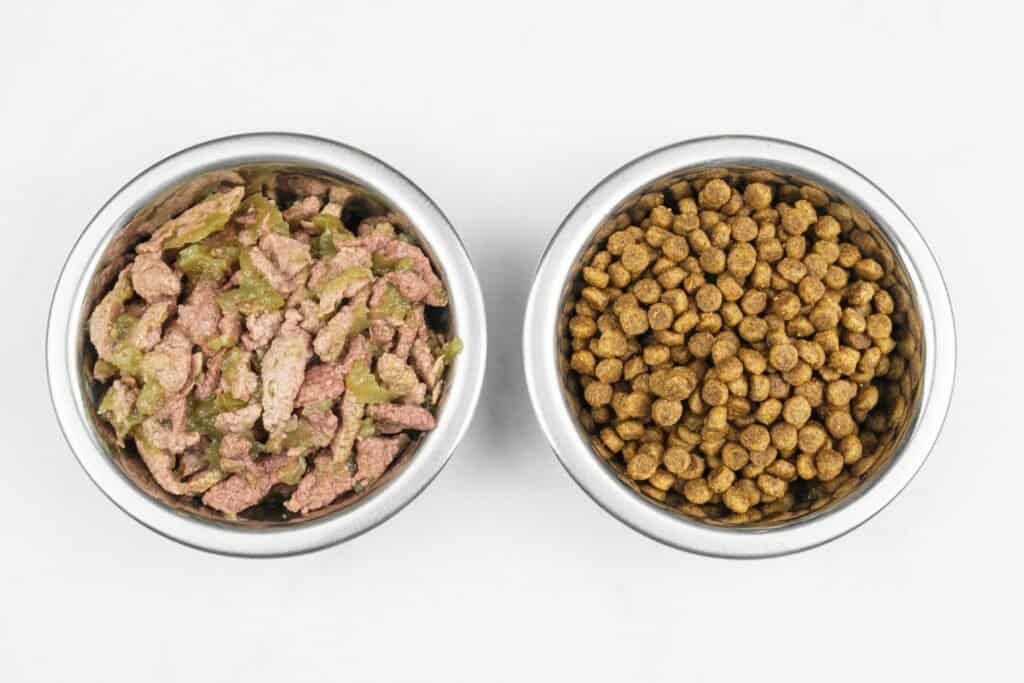
Monthly supplies such as cat food, treats, and litter are recurring payments you’ll need to budget for.
©Galina-Photo/Shutterstock.com
One-time Essentials
Essentials are generally a one-time purchase with the needed replacement every few years. This includes food and water bowls, carriers, and a bed. Other essentials will be a litter box, nail clippers, and a brush. Generally, you can expect to pay $115 on the low end and $400 on the higher end.
Recurring Items
Monthly supplies such as cat food, treats, and litter are recurring payments you’ll need to budget for. Birmans need a diet with high protein, low carbs, and moderate fats. Treats can be any cat treat, but they should only be given occasionally.
Lastly, litter can be anything you can find, but some people like to get scented or high-quality cat litter. These expenses should equal around $100 monthly, depending on what you buy.
Toys
The Birman breed is gentle and social but loves playing with its owners. Having readily available cat toys is a must. This can include toys that move around, ones you can dangle in front of them, and a decent scratching post.
How Much Does It Cost to Insure a Birman Cat?
Pet insurance varies in cost due to a few factors. The factors that impact the price are the cat’s age, zip code, and any preexisting medical conditions. Generally, most pet owners can expect to pay anywhere from $20 to $60 per month on cat insurance plans.
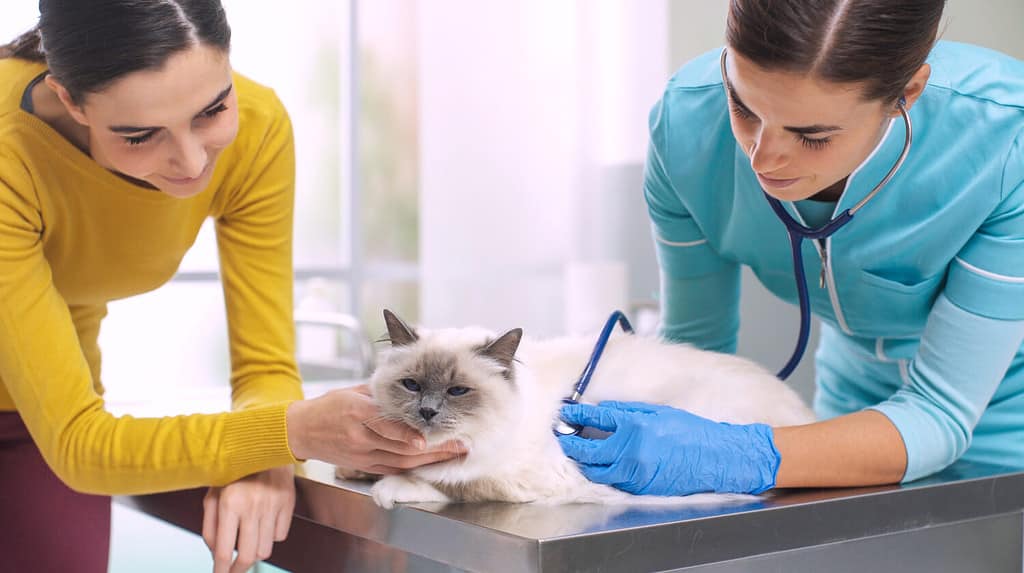
The gentle breed is a relatively healthy pet and doesn’t have that many genetic issues. However, pet insurance is a good idea in case of an emergency.
©Stock-Asso/Shutterstock.com
Do Birman Cats Need Pet Insurance?
The gentle breed is a relatively healthy pet and doesn’t have that many genetic issues. However, pet insurance is a good idea in case of an emergency. We previously discussed some possible medical issues that can pop up, which can be covered by insurance if you have it before the conditions occur.
Where Do I Get a Pet Insurance Quote?
Pet insurance can be found on either Geico or Progressive. These sites can provide you with quotes for pet insurance for your Birman kitten. However, your best bet is to make an appointment with your local veterinarian’s office.
You can ask your pet what cat insurance they accept at the office. They can give you a rundown of the price and what is covered.
Total Birman Cat Prices
As an estimate, you can expect that Birman cat prices in 2024 will be $400 to $3,000. The first medical and vaccination expenses will cost around $400. At the same time, you can expect a few thousand if a health issue pops up.
As for supplies, you should budget for around $115 to $400, with $100 of monthly required supplies. Lastly, add any extras and budget an extra $100 to $300. In total, you can expect to spend around $615 minimum and up to $3,600 for Birman cat prices.
The photo featured at the top of this post is © Grez, CC BY-SA 3.0, via Wikimedia Commons – License / Original
Thank you for reading! Have some feedback for us? Contact the AZ Animals editorial team.






